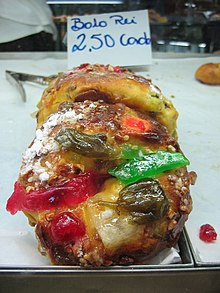Bolo Rei
 |
|
| Type | Cake |
|---|---|
| Place of origin | Portugal |
| Main ingredients | Flour, eggs, butter, dried fruit, nuts, candied fruit |
| |
|
Bolo Rei (English: "King Cake") is a traditional Portuguese cake that is usually eaten around Christmas, from December 25 until Epiphany (Dia de Reis in Portuguese, literally "Kings' Day," a reference to the Three Wise Men), on the 6th of January. It is a staple dessert in any Portuguese home during the holidays.
Bolo rei recipe is from France which finds its way to Portugal during the 19th century when Confeitaria Nacional opened as Portuguese monarchy’s official bakery in 1829. The Confeitaria was the first to introduce this recipe to the country.
The cake itself is round with a large hole in the centre, resembling a crown covered with crystallized and dried fruit.
The bolo rei is baked from a soft, white dough, with raisins, various nuts and crystallized fruit. Also included is the characteristic dried fava bean, and tradition dictates that whoever finds the fava has to pay for the bolo rei next year. A small prize (usually a small metal toy) was also included within the cake. The inclusion of the prize has been discontinued since the mid-90s, due to potential choking hazards.
In 2009, a giant Bolo rei measuring about 70 metres (230 ft) and weighing around 200 kilograms (440 lb) was baked for the town of Olhão by pastry chef Filipe Martins of Pastelaria Kubidoce.
...
Wikipedia
